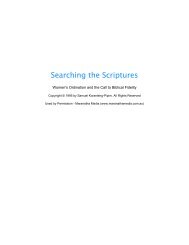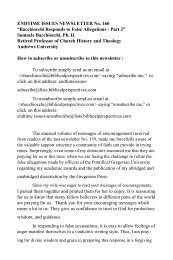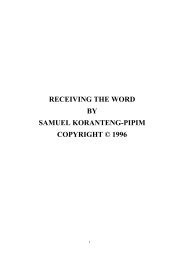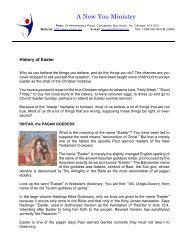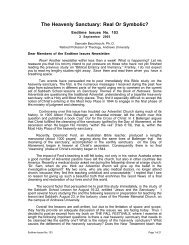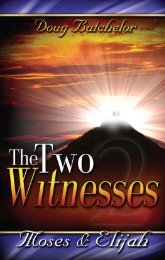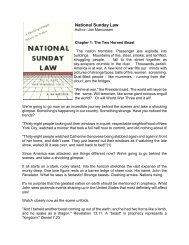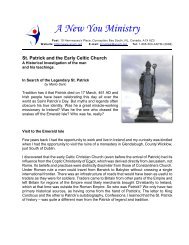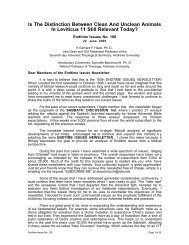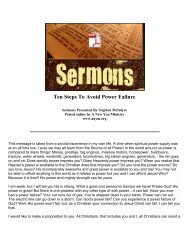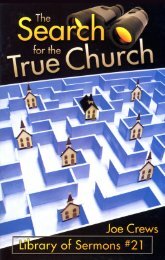Bible Readings for the Home Circleâ1914 - A New You Ministry
Bible Readings for the Home Circleâ1914 - A New You Ministry
Bible Readings for the Home Circleâ1914 - A New You Ministry
You also want an ePaper? Increase the reach of your titles
YUMPU automatically turns print PDFs into web optimized ePapers that Google loves.
BIBLE READINGS<br />
11. When and by whom was <strong>the</strong> Council of Nice convened<br />
By <strong>the</strong> emperor Constantine, 325 A.D.<br />
12. Under what authority were its decrees published {486<br />
486}<br />
“The decrees . . . were published under <strong>the</strong> imperial authority, and<br />
thus obtained a political importance.” Id., page 133.<br />
13. What was one principal object in calling this council<br />
“The question relating to <strong>the</strong> observance of Easter, which was agitated<br />
in <strong>the</strong> time of Anicetus and Polycarp, and afterward in that of Victor,<br />
was still undecided. It was one of <strong>the</strong> principal reasons <strong>for</strong> convoking <strong>the</strong><br />
Council of Nice, being <strong>the</strong> most important subject to be considered after<br />
<strong>the</strong> Arian controversy.”<br />
“It appears that <strong>the</strong> churches of Syria and Mesopotamia continued to<br />
follow <strong>the</strong> custom of <strong>the</strong> Jews, and celebrated Easter on <strong>the</strong> fourteenth day<br />
of <strong>the</strong> moon, whe<strong>the</strong>r falling on Sunday or not. All <strong>the</strong> o<strong>the</strong>r churches observed<br />
that solemnity on Sunday only, namely; those of Rome, Italy, Africa,<br />
Lydia, Egypt, Spain, Gaul, and Britain; and all Greece, Asia, and Pontus.”<br />
Boyle’s “Historical View of <strong>the</strong> Council of Nice,” page 23, edition 1836.<br />
14. How was <strong>the</strong> matter finally decided<br />
“Easter day was fixed on <strong>the</strong> Sunday immediately following <strong>the</strong> full<br />
moon which was nearest after <strong>the</strong> vernal equinox.” Id., page 24.<br />
15. What was decreed by <strong>the</strong> Council of Laodicea, A.D. 364<br />
That Christians should keep <strong>the</strong> Sunday, and that if <strong>the</strong>y persisted in<br />
resting on <strong>the</strong> Sabbath, “<strong>the</strong>y shall be shut out from Christ.” See Hefele’s<br />
“History of <strong>the</strong> Councils of <strong>the</strong> Church,” Vol. 11, page 316.<br />
16. What imperial law was issued in A.D. 386<br />
“By a law of <strong>the</strong> year 386, those older changes effected by Constantine<br />
were more vigorously en<strong>for</strong>ced; and, in general, civil transactions of every<br />
kind on Sunday were strictly <strong>for</strong>bidden.” Neander’s “Church History,”<br />
Vol. II, page 300.<br />
17. What petition was made to <strong>the</strong> emperor by a church convention<br />
of bishops in A.D. 401<br />
“That <strong>the</strong> public shows might be transferred from <strong>the</strong> Christian Sunday<br />
and from <strong>the</strong> feast-days to some o<strong>the</strong>r days of <strong>the</strong> week.” Ib.<br />
NOTE.— The desired law was secured in 425 A.D. See pages 444, 489.<br />
18. What was <strong>the</strong> object of <strong>the</strong> church bishops in securing <strong>the</strong>se Sunday<br />
laws<br />
“That <strong>the</strong> day might be devoted with less interruption to {487<br />
487} <strong>the</strong><br />
purposes of devotion.” “That <strong>the</strong> devotion of <strong>the</strong> faithful might be free<br />
from all disturbance.” Id., pages 297, 301.<br />
19. How was <strong>the</strong> “devotion” of <strong>the</strong> “faithful” disturbed<br />
UNION OF CHURCH AND STATE<br />
“Church teachers . . . were, in truth, often <strong>for</strong>ced to complain that in<br />
such competitions <strong>the</strong> <strong>the</strong>ater was vastly more frequented than <strong>the</strong> church.”<br />
Id., page 300.<br />
20. What does Neander say of <strong>the</strong> securing of <strong>the</strong>se laws<br />
“In this way <strong>the</strong> church received help from <strong>the</strong> state <strong>for</strong> <strong>the</strong> fur<strong>the</strong>rance<br />
of her ends.” Id., page 301.<br />
NOTE.— In this way, more perhaps than in any o<strong>the</strong>r, church and state<br />
were united. In this way <strong>the</strong> church gained control of <strong>the</strong> civil power,<br />
which she later used as a means of carrying on most bitter and extensive<br />
persecutions. In this way she denied Christ and <strong>the</strong> power of godliness.<br />
21. When <strong>the</strong> church had received help from <strong>the</strong> state to this extent,<br />
what more did she demand<br />
That <strong>the</strong> civil power should be exerted to compel men to serve God as<br />
<strong>the</strong> church should dictate.<br />
22. What did Augustine, <strong>the</strong> fa<strong>the</strong>r of this <strong>the</strong>ocratical or churchand-state<br />
<strong>the</strong>ory, teach concerning it<br />
“Who doubts but what it is better to be led to God by instruction than<br />
by fear of punishment or affliction But because <strong>the</strong> <strong>for</strong>mer, who will be<br />
guided only by instruction, are better, <strong>the</strong> o<strong>the</strong>rs are still not to be neglected.<br />
. . . Many, like bad servants, must often be reclaimed to <strong>the</strong>ir<br />
Master by <strong>the</strong> rod of temporal suffering, ere <strong>the</strong>y can attain to this highest<br />
stage of religious development.” Id., pages 214, 215.<br />
23. What is Neander’s conclusion regarding this <strong>the</strong>ory<br />
“It was by Augustine, <strong>the</strong>n, that a <strong>the</strong>ory was proposed and founded,<br />
which, tempered though it was, in its practical application, by his own pious,<br />
philanthropic spirit, never<strong>the</strong>less contained <strong>the</strong> germ of that whole system<br />
of spiritual despotism, of intolerance and persecution, which ended in<br />
<strong>the</strong> tribunals of <strong>the</strong> Inquisition.” “He did not give precedence to <strong>the</strong> question,<br />
What is right over <strong>the</strong> question, What is expedient But a <strong>the</strong>ory which<br />
overlooks <strong>the</strong>se distinctions leaves room <strong>for</strong> any despotism which would<br />
make holy ends a pretext <strong>for</strong> <strong>the</strong> use of unholy means.” Id., pages 217, 249,<br />
250.<br />
NOTE.— It was thus that <strong>the</strong> union of church and state was <strong>for</strong>med,<br />
out of which was developed “<strong>the</strong> beast,” or Papacy, of <strong>the</strong> Apocalypse,<br />
which made “war with <strong>the</strong> saints” and overcame <strong>the</strong>m. A like<br />
course cannot fail to produce like results today. Dr. Philip Schaff, in his<br />
work on “Church and State,” page 11, well says: “Secular power has<br />
proved a satanic gift to <strong>the</strong> church, and ecclesiastical power has proved<br />
an engine of tyranny in <strong>the</strong> hands of <strong>the</strong> state.”




